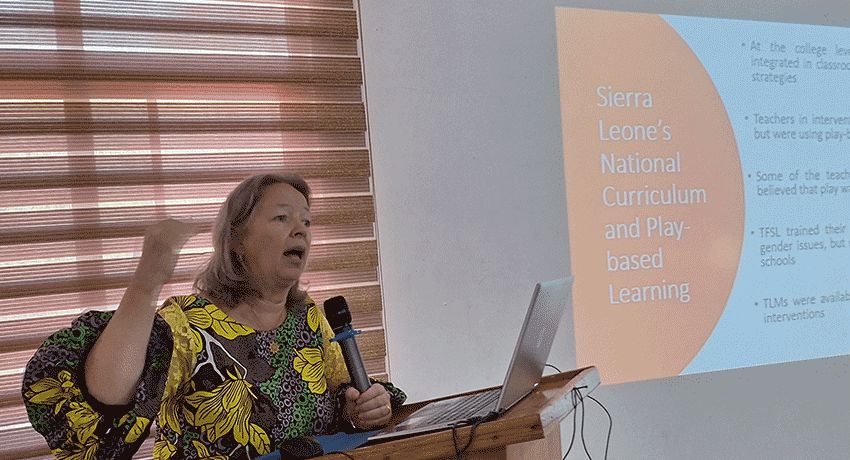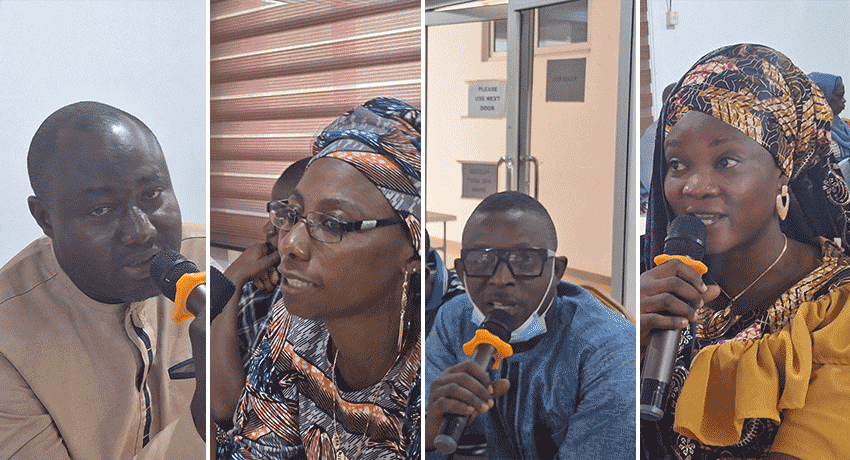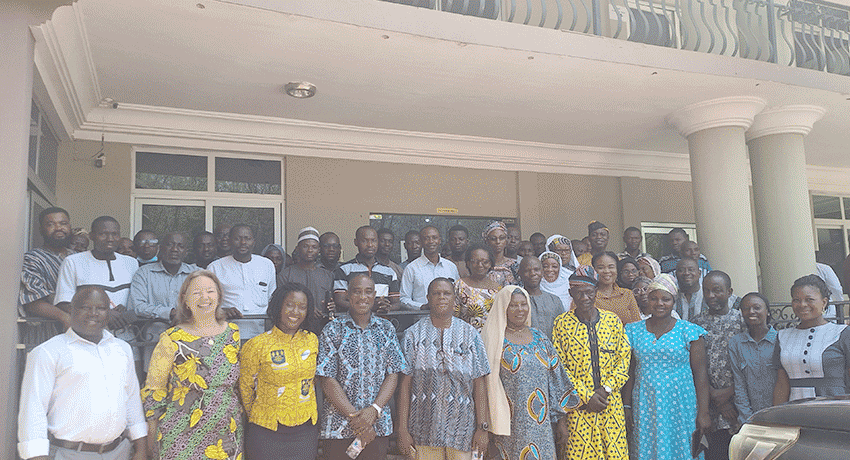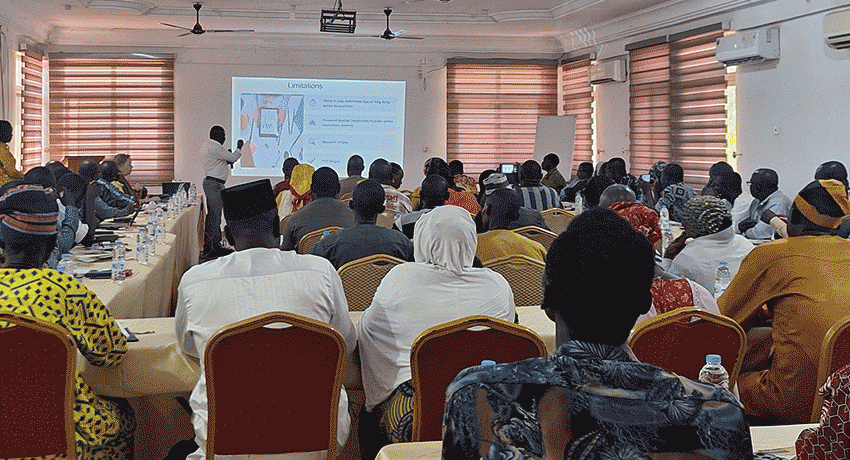Dr. Clement Adamba presents quantitative findings on the successes, challenges and areas for improvement in Ghana’s ECE sector to attentive participants.
The Northern Regional capital, Tamale, was the venue for a workshop on play-based learning and Early Child Education (ECE) in Ghana. The event brought together over 70 ECE stakeholders from various districts in the Northern region and a collaborative team of researchers from the Institute of Statistical, Social and Economic Research (ISSER), the University of Ghana, and Associates for Change, providing a platform to share and discuss the findings of a joint study on play based education in Ghana. It was also an opportunity to engage ECE teachers, administrators and other stakeholders in broader discussions on strategies and interventions for advancing play-based education in Ghana.
The “Teacher Capacity for Play-Based Early Learning in Ghana and Sierra Leone” is a KIX-IDRC-funded study jointly implemented by ISSER, the Division of Education Studies, University of Sierra Leone, and research consulting firm, Associates for Change (AFC).
“Going back to research participants and stakeholders to share the results of our research activities is one of the most fulfilling aspects of work. The enthusiastic turn-out and engagement of participants signals the importance they place on research as an important pathway towards achieving sustainable development,” Prof. Peter Quartey stated in welcome remarks, which he delivered virtually.

Dr. Leslie Casely-Hayford presents insights from qualitative research, drawing parallels between educational landscapes in Ghana and Sierra Leone.
Dr. Clement Adamba presented quantitative research findings from Northern Ghana, delving into statistical analyses and key observations. Following his presentation, Dr. Leslie Casely-Hayford, AFC Director and Co-Principal Investigator, provided insights from qualitative research, drawing parallels between educational landscapes in Ghana and Sierra Leone.
The presentations explored various aspects, including the adaptation of Ghana's educational system to the new early learning curriculum, challenges in school infrastructure and resources, and the need for teacher capacity building in play-based pedagogy. Discussions ensued on the progress made in play-based learning approaches, as well as persistent challenges such as inadequate resources and training gaps.
"The findings reflect the reality,” said Gladys Deborah Pareseh, Regional ECE Coordinator, in comments that highlighted the stark reality of infrastructure limitations, and poor teacher-pupil ratio, advocating for increased government support in impoverished communities.

Participants engaged actively in the discussions, providing valuable feedback vital for strengthening evidence-based strategies for enhancing play-based education in Ghana.
Other participants shared similar sentiments. Cyprian Ekor, representing Right to Play (RTP), expressed satisfaction with the positive impact of innovators like RTP reflected in the findings. Hamdaratu Abdul-Majeed, Metropolitan SHEP Coordinator, praised the comprehensive nature of the research and emphasized the significance of its recommendations for policy formulation.
Among other conclusions, the workshop emphasized the importance of research-driven interventions in advancing ECE development. Participants acknowledged the challenges and reiterated the need for concerted efforts, particularly from government stakeholders, to address infrastructure deficits and training needs. Despite concerns about research fatigue, stakeholders affirmed their commitment to supporting and collaborating on future research endeavors aimed at driving sustainable development in the region.
The workshop was held on 19 April at the Modern City Hotel, Tamale.

Participants, including teachers, administrators, and media representatives, joined the workshop from nearly ten districts in the Northern Region.
For additional content on the study, please read/download:
Playful Pathways: Advancing Early Childhood Education in Ghana through Play-Based Learning – policy brief by Vicentia Quartey and Clement Adamba
The Impact of Play-Based Learning Pedagogy on Learners - policy brief by Nana Amma Asante-Poku, Clement Adamba, Joana Guo and Cynthia Akwei
Advancing play-based learning through improved continuous professional development - policy brief by Vicentia Quartey, Joana Guo, Peter Quartey, Cynthia Akwei, Jennifer Quaicoe
Teacher beliefs, attitudes and practices in play-based teaching and learning in Ghana - policy brief Nana Nana Amma Asante-Poku, Joana Guo, Peter Quartey, Leslie Casely-Hayford, Jennifer Quaicoe
About the project
“Teacher capacity for play-based early learning in Ghana and Sierra Leone” is a KIX-IDRC-funded project jointly implemented by ISSER, the Division of Education Studies, University of Sierra Leone, and Associates for Change. It was led by Prof. Peter Quartey as Principal Investigator (P.I) and Dr. Leslie Casely-Hayford as Co-P.I. The project team also included Dr. Clement Adamba, Prof. Cynthia Akwei, Dr. Nana Amma Asante-Poku, Vicentia Quartey, Rukayatu Adam and Joana Guo.
For more information, please contact Dr. Nana Amma Asante-Poku at naasante-poku@ug.edu.gh
- Log in to post comments

